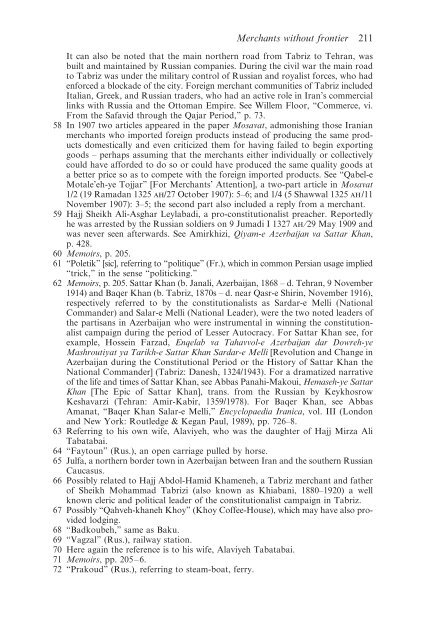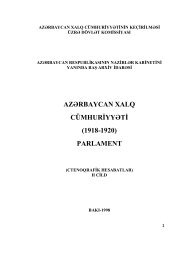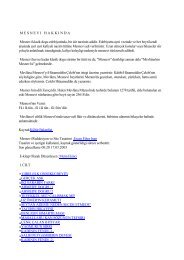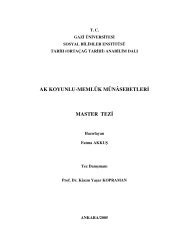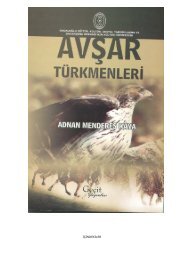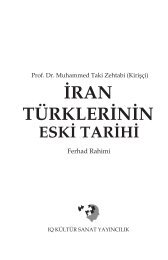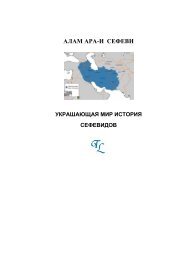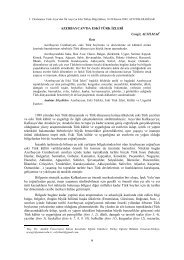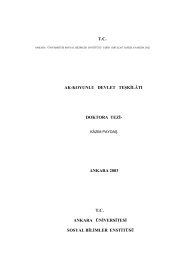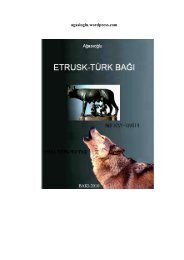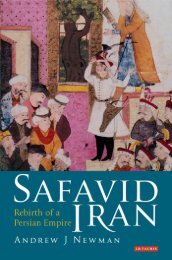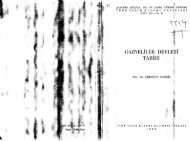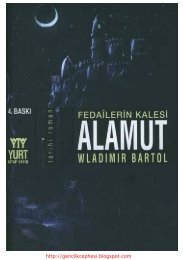Merchants without frontier 211It can also be noted that the ma<strong>in</strong> northern road from Tabriz to Tehran, wasbuilt <strong>and</strong> ma<strong>in</strong>ta<strong>in</strong>ed by Russian companies. Dur<strong>in</strong>g the civil war the ma<strong>in</strong> roadto Tabriz was under the military control of Russian <strong>and</strong> royalist forces, who hadenforced a blockade of the city. Foreign merchant communities of Tabriz <strong>in</strong>cludedItalian, Greek, <strong>and</strong> Russian traders, who had an active role <strong>in</strong> Iran’s commerciall<strong>in</strong>ks with Russia <strong>and</strong> the Ottoman Empire. See Willem Floor, “Commerce, vi.From the Safavid through the <strong>Qajar</strong> Period,” p. 73.58 In 1907 two articles appeared <strong>in</strong> the paper Mosavat, admonish<strong>in</strong>g those Iranianmerchants who imported foreign products <strong>in</strong>stead of produc<strong>in</strong>g the same productsdomestically <strong>and</strong> even criticized them for hav<strong>in</strong>g failed to beg<strong>in</strong> export<strong>in</strong>ggoods – perhaps assum<strong>in</strong>g that the merchants either <strong>in</strong>dividually or collectivelycould have afforded to do so or could have produced the same quality goods ata better price so as to compete with the foreign imported products. See “Qabel-eMotale’eh-ye Tojjar” [For Merchants’ Attention], a two-part article <strong>in</strong> Mosavat1/2 (19 Ramadan 1325 ah/27 October 1907): 5–6; <strong>and</strong> 1/4 (5 Shawwal 1325 ah/11November 1907): 3–5; the second part also <strong>in</strong>cluded a reply from a merchant.59 Hajj Sheikh Ali-Asghar Leylabadi, a pro-constitutionalist preacher. Reportedlyhe was arrested by the Russian soldiers on 9 Jumadi I 1327 ah⁄29 May 1909 <strong>and</strong>was never seen afterwards. See Amirkhizi, Qiyam-e Azerbaijan va Sattar Khan,p. 428.60 Memoirs, p. 205.61 “Poletik” [sic], referr<strong>in</strong>g to “politique” (Fr.), which <strong>in</strong> common <strong>Persia</strong>n usage implied“trick,” <strong>in</strong> the sense “politick<strong>in</strong>g.”62 Memoirs, p. 205. Sattar Khan (b. Janali, Azerbaijan, 1868 – d. Tehran, 9 November1914) <strong>and</strong> Baqer Khan (b. Tabriz, 1870s – d. near Qasr-e Shir<strong>in</strong>, November 1916),respectively referred to by the constitutionalists as Sardar-e Melli (NationalComm<strong>and</strong>er) <strong>and</strong> Salar-e Melli (National Leader), were the two noted leaders ofthe partisans <strong>in</strong> Azerbaijan who were <strong>in</strong>strumental <strong>in</strong> w<strong>in</strong>n<strong>in</strong>g the constitutionalistcampaign dur<strong>in</strong>g the period of Lesser Autocracy. For Sattar Khan see, forexample, Hosse<strong>in</strong> Farzad, Enqelab va Tahavvol-e Azerbaijan dar Dowreh-yeMashroutiyat ya Tarikh-e Sattar Khan Sardar-e Melli [Revolution <strong>and</strong> Change <strong>in</strong>Azerbaijan dur<strong>in</strong>g the Constitutional Period or the History of Sattar Khan theNational Comm<strong>and</strong>er] (Tabriz: Danesh, 1324/1943). For a dramatized narrativeof the life <strong>and</strong> times of Sattar Khan, see Abbas Panahi-Makoui, Hemaseh-ye SattarKhan [The Epic of Sattar Khan], trans. from the Russian by KeykhosrowKeshavarzi (Tehran: Amir-Kabir, 1359/1978). For Baqer Khan, see AbbasAmanat, “Baqer Khan Salar-e Melli,” Encyclopaedia Iranica, vol. III (London<strong>and</strong> New York: Routledge & Kegan Paul, 1989), pp. 726–8.63 Referr<strong>in</strong>g to his own wife, Alaviyeh, who was the daughter of Hajj Mirza AliTabatabai.64 “Faytoun” (Rus.), an open carriage pulled by horse.65 Julfa, a northern border town <strong>in</strong> Azerbaijan between Iran <strong>and</strong> the southern RussianCaucasus.66 Possibly related to Hajj Abdol-Hamid Khameneh, a Tabriz merchant <strong>and</strong> fatherof Sheikh Mohammad Tabrizi (also known as Khiabani, 1880–1920) a wellknown cleric <strong>and</strong> political leader of the constitutionalist campaign <strong>in</strong> Tabriz.67 Possibly “Qahveh-khaneh Khoy” (Khoy Coffee-House), which may have also providedlodg<strong>in</strong>g.68 “Badkoubeh,” same as Baku.69 “Vagzal” (Rus.), railway station.70 Here aga<strong>in</strong> the reference is to his wife, Alaviyeh Tabatabai.71 Memoirs, pp. 205–6.72 “Prakoud” (Rus.), referr<strong>in</strong>g to steam-boat, ferry.
212 Ali Gheissari73 Taqiof was runn<strong>in</strong>g a steam-boat l<strong>in</strong>e between Baku <strong>and</strong> Anzali. This is also aclear <strong>in</strong>dication that <strong>in</strong> this period <strong>in</strong> order to travel from Tabriz to Rasht, mosttravellers <strong>and</strong> merchants used the Russian route, go<strong>in</strong>g first to Baku <strong>and</strong> fromthere travell<strong>in</strong>g by water via the Caspian Sea to Anzali, which was the ma<strong>in</strong> maritimeport of entry to north Iran with considerable commercial ties with the Caucasusports of Baku <strong>and</strong> Astarakhan. Anzali also functioned as the major trad<strong>in</strong>g po<strong>in</strong>tfor Rasht. In 1880 a carriageway was opened between Anzali’s <strong>in</strong>ner harbour,known as Pir B<strong>az</strong>aar, <strong>and</strong> Rasht; shortly after 1900 the ma<strong>in</strong> road l<strong>in</strong>k<strong>in</strong>g Anzali<strong>and</strong> Rasht directly was completed. See M. B<strong>az</strong><strong>in</strong>, “Anzali,” EnclyclopaediaIranica, vol. II (London <strong>and</strong> New York: Routledge & Kegan Paul, 1987), pp. 143–5.74 “Barkas” (Rus.), motor-boat.75 They travelled by motor-boat on Mordab-e Anzali (Anzali Lagoon) to Rasht.76 Memoirs, p. 206.77 See Ahmad Mahrad, Iran am Vorabend des II. Weltkrieges, E<strong>in</strong> Materialsammburgdeutscher, britischer und sowjetischer Geheimberichte (Osnabrück: Eigenverlag A.Mahrad, 1978), p. 528; cited <strong>in</strong> Floor, Industrialization <strong>in</strong> Iran, p. 53. TheJourabchis also had a yarn sp<strong>in</strong>n<strong>in</strong>g factory, which was set up <strong>in</strong> 1936 <strong>in</strong> Tehran.See Salnameh-ye Pars [Pars Yearbook] (Tehran, 1315/1936), p. 214; cited <strong>in</strong>Floor, Industrialization <strong>in</strong> Iran, p. 62.78 For a more detailed Iranian account of the pilgrimage to Mecca <strong>in</strong> the late n<strong>in</strong>eteenthcentury, see Mirza Mohammad Hosayn Farahani, A Shiite Pilgrimage toMecca, (1885–1886): The Safarnameh of Mirza Mohammad Hosayn Farahani, ed.,trans., <strong>and</strong> annotated by Hafez Farmayan <strong>and</strong> Elton L. Daniel (Aust<strong>in</strong>, TX:University of Texas Press, 1990).79 In 1905 Hajj Mohammad-Taqi went to Mecca. In his Memoirs he estimated thenumber of pilgrims to Mecca <strong>in</strong> that year at 280,000, <strong>in</strong>clud<strong>in</strong>g 12,000 Shia pilgrims;he also po<strong>in</strong>ted out certa<strong>in</strong> tensions among the Shia <strong>and</strong> Sunni pilgrims<strong>in</strong> Mecca dur<strong>in</strong>g the ceremonies. See, Memoirs, p. 121.80 Hajj Mohammad-Taqi himself might have been a member, or at least was an occasionalattendant, of the constitutionalist Anjoman of Rasht – as can be noted <strong>in</strong>the follow<strong>in</strong>g remark: “It was the third of Muharram [1330 ah/24 December 1911],<strong>and</strong> no one was com<strong>in</strong>g to Anjoman except Aqa Mirza Abd al-Wahhab.”Memoirs, p. 219. Presumably the reference here is to Seyyed Abd al-Wahhab Salehwho was among the pr<strong>in</strong>cipal deputies of the Anjoman. See Fakhra’i, Gilan darJonbesh-e Mashroutiyat, p. 139.81 It can further be noted that there is no <strong>in</strong>dication <strong>in</strong> the Memoirs of HajjMohammad-Taqi’s own choice of marja’ (source of emulation <strong>in</strong> religious matters),nor is any op<strong>in</strong>ion voiced on the Sheikhi/Usuli divisions <strong>in</strong> Tabriz at thetime – though, given their association with Mirza Ali Theqat al-Eslam (d. 10Muharram 1330 AH/31 December 1911, hanged by the Russians for protest<strong>in</strong>gtheir occupation of Tabriz), the Jourabchis may have had some <strong>in</strong>terest <strong>in</strong>Sheikhism.
- Page 2 and 3:
War and Peace in Qajar PersiaPersia
- Page 4 and 5:
War and Peace inQajar PersiaImplica
- Page 6 and 7:
ContentsList of figuresContributors
- Page 8 and 9:
Figures5.1 Omani enclaves 1305.2 Ar
- Page 10 and 11:
Contributor listMansoureh Ettehadie
- Page 12:
AcknowledgementsThis volume grew ou
- Page 15 and 16:
2 Roxane Farmanfarmaianrepresented
- Page 17 and 18:
4 Roxane Farmanfarmaianchapter in t
- Page 19 and 20:
6 Roxane FarmanfarmaianThus, two si
- Page 21 and 22:
8 Roxane Farmanfarmaiangaining grea
- Page 23 and 24:
10 Roxane Farmanfarmaiantough deals
- Page 25 and 26:
12 Roxane FarmanfarmaianIranian geo
- Page 27 and 28:
14 Peter W. Averyin Shiraz and cont
- Page 29 and 30:
16 Peter W. Averybut the invasion w
- Page 32:
Part IWar
- Page 35 and 36:
22 Manoutchehr M. Eskandari-Qajarth
- Page 37 and 38:
24 Manoutchehr M. Eskandari-Qajarap
- Page 39 and 40:
26 Manoutchehr M. Eskandari-Qajarmi
- Page 41 and 42:
28 Manoutchehr M. Eskandari-Qajarth
- Page 43 and 44:
30 Manoutchehr M. Eskandari-Qajardo
- Page 45 and 46:
32 Manoutchehr M. Eskandari-QajarIn
- Page 47 and 48:
34 Manoutchehr M. Eskandari-Qajarco
- Page 49 and 50:
36 Manoutchehr M. Eskandari-QajarTh
- Page 51 and 52:
38 Manoutchehr M. Eskandari-Qajarth
- Page 53 and 54:
40 Manoutchehr M. Eskandari-Qajarth
- Page 55 and 56:
42 Manoutchehr M. Eskandari-Qajarop
- Page 57 and 58:
44 Manoutchehr M. Eskandari-Qajarbe
- Page 59 and 60:
46 Manoutchehr M. Eskandari-Qajarva
- Page 61 and 62:
48 Stephanie Cronincapacity and res
- Page 63 and 64:
50 Stephanie Croninforces of the es
- Page 65 and 66:
52 Stephanie CroninPART ONE: THE QA
- Page 67 and 68:
54 Stephanie Croninprincipally on h
- Page 69 and 70:
56 Stephanie CroninThe French offic
- Page 71 and 72:
58 Stephanie CroninEuropean alignme
- Page 73 and 74:
60 Stephanie Croninthe authorities
- Page 75 and 76:
62 Stephanie Croninin the revolutio
- Page 77 and 78:
64 Stephanie Croninof power and sta
- Page 79 and 80:
66 Stephanie Croninliving and the m
- Page 81 and 82:
68 Stephanie Croninconsequences for
- Page 83 and 84:
70 Stephanie Croninrevolution was a
- Page 85 and 86:
72 Stephanie CroninNew British miss
- Page 87 and 88:
74 Stephanie CroninBrigade to a Div
- Page 89 and 90:
76 Stephanie Croninwithout the sove
- Page 91 and 92:
78 Stephanie Croninaccounting devic
- Page 93 and 94:
80 Stephanie Croninbut also faced a
- Page 95 and 96:
82 Stephanie Cronindetermined on th
- Page 97 and 98:
84 Stephanie Cronin15 For a discuss
- Page 99 and 100:
86 Stephanie Cronin55 The Anglo-Rus
- Page 101 and 102:
3 The Turko-Persian War1821-1823Win
- Page 103 and 104:
90 Graham WilliamsonThe resultant w
- Page 105 and 106:
92 Graham Williamsonprovincial forc
- Page 107 and 108:
94 Graham WilliamsonThe field armyO
- Page 109 and 110:
96 Graham Williamsonnot hold out mu
- Page 111 and 112:
98 Graham Williamsonoften in arrear
- Page 113 and 114:
100 Graham Williamsonthan any desig
- Page 115 and 116:
102 Graham WilliamsonThere were ove
- Page 117 and 118:
104 Graham Williamsonone should not
- Page 119 and 120:
Table 3.2 Persian regional armies (
- Page 121 and 122:
108 Graham WilliamsonIranian influe
- Page 123 and 124:
4 Social networks andborder conflic
- Page 125 and 126:
112 Vanessa MartinPersian troops on
- Page 127 and 128:
114 Vanessa Martinof comparatively
- Page 129 and 130:
116 Vanessa MartinTHE ROLE OF SOCIA
- Page 131 and 132:
118 Vanessa MartinThe Shah’s negl
- Page 133 and 134:
120 Vanessa Martinborder or any oth
- Page 135 and 136:
122 Vanessa Martin44 No. 38, 2 June
- Page 138 and 139:
5 The consolidation of Iran’sfron
- Page 140 and 141:
Consolidation of Iran’s frontier
- Page 142 and 143:
Consolidation of Iran’s frontier
- Page 144 and 145:
Consolidation of Iran’s frontier
- Page 146 and 147:
Consolidation of Iran’s frontier
- Page 148 and 149:
Consolidation of Iran’s frontier
- Page 150 and 151:
Figure 5.2 Arab principalities
- Page 152 and 153:
Consolidation of Iran’s frontier
- Page 154 and 155:
Consolidation of Iran’s frontier
- Page 156 and 157:
Consolidation of Iran’s frontier
- Page 158 and 159:
Consolidation of Iran’s frontier
- Page 160 and 161:
Consolidation of Iran’s frontier
- Page 162 and 163:
6 Narrowing the frontierMid-ninetee
- Page 164 and 165:
Narrowing the frontier 151witnessed
- Page 166 and 167:
Figure 6.1 The 1843 borderlands sta
- Page 168 and 169:
Narrowing the frontier 155And the S
- Page 170 and 171:
Figure 6.2 The 1850 Williams line a
- Page 172 and 173:
Narrowing the frontier 159elicited
- Page 174 and 175: Narrowing the frontier 161travellin
- Page 176 and 177: Narrowing the frontier 163be found
- Page 178 and 179: Narrowing the frontier 165A similar
- Page 180 and 181: Narrowing the frontier 167and accep
- Page 182 and 183: Narrowing the frontier 169Perhaps t
- Page 184 and 185: Narrowing the frontier 171By this s
- Page 186 and 187: Narrowing the frontier 17346 For a
- Page 188 and 189: Crime, security, and insecurity 175
- Page 190 and 191: Crime, security, and insecurity 177
- Page 192 and 193: Crime, security, and insecurity 179
- Page 194 and 195: Crime, security, and insecurity 181
- Page 196 and 197: 8 Merchants without bordersTrade, t
- Page 198 and 199: Merchants without frontier 185the m
- Page 200 and 201: Merchants without frontier 187and d
- Page 202 and 203: Merchants without frontier 189photo
- Page 204 and 205: Merchants without frontier 191their
- Page 206 and 207: Merchants without frontier 193In an
- Page 208 and 209: Figure 8.1Seated, first from left:
- Page 210 and 211: Figure 8.3Seated: Hajj Mohammad-Taq
- Page 212 and 213: Figure 8.5 Taken in Hajj Hasan Jour
- Page 214 and 215: Merchants without frontier 201Figur
- Page 216 and 217: Merchants without frontier 203Studi
- Page 218 and 219: Merchants without frontier 20516 Me
- Page 220 and 221: Merchants without frontier 207and t
- Page 222 and 223: Merchants without frontier 209or pu
- Page 226 and 227: 9 The politics of concessionReasses
- Page 228 and 229: The politics of concession 215gradu
- Page 230 and 231: The politics of concession 217Shah,
- Page 232 and 233: The politics of concession 219assig
- Page 234 and 235: The politics of concession 221compa
- Page 236 and 237: The politics of concession 223gross
- Page 238 and 239: The politics of concession 225the B
- Page 240 and 241: The politics of concession 227as th
- Page 242 and 243: IndexAbbas Mirza, Crown Prince 6, 1
- Page 244 and 245: Index 231Gulf Arabs 127-9Gwadar 136
- Page 246 and 247: Index 233policy in Persian Gulf 131


